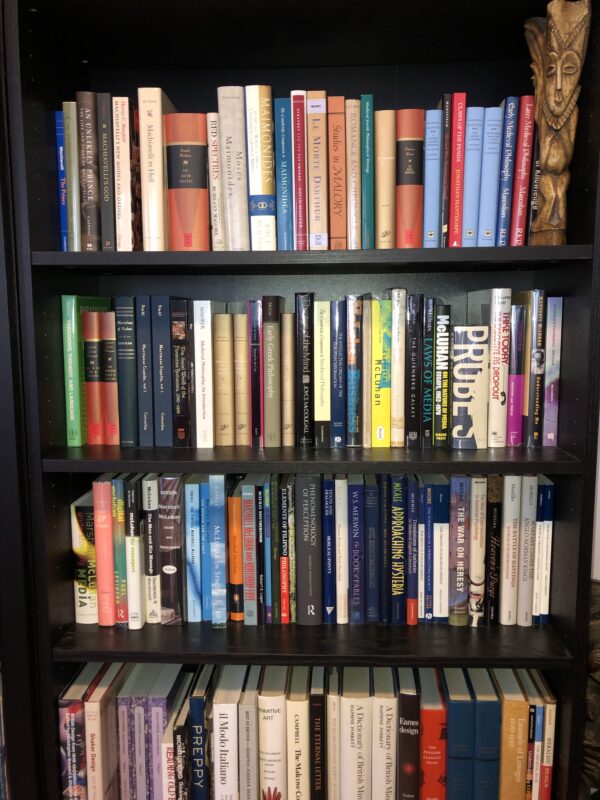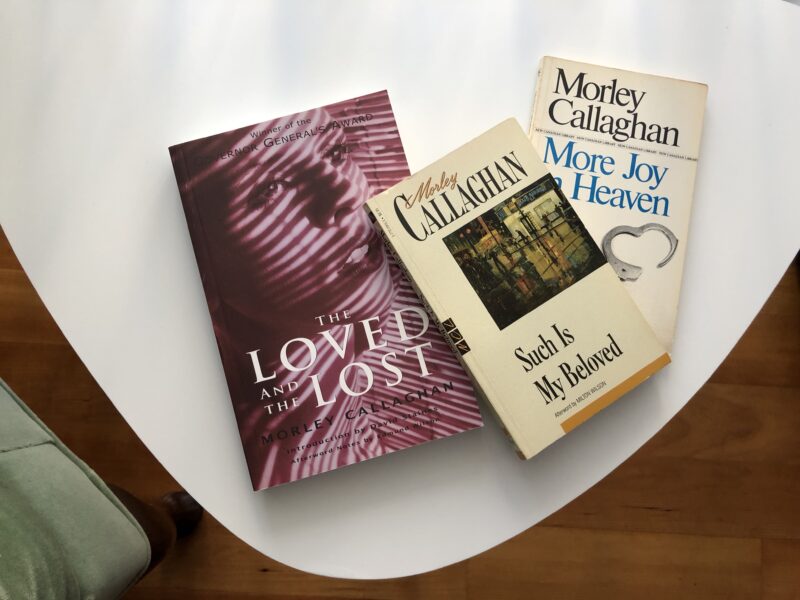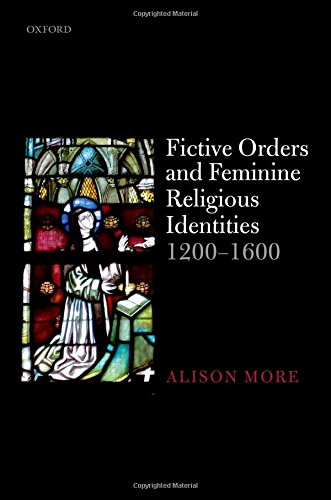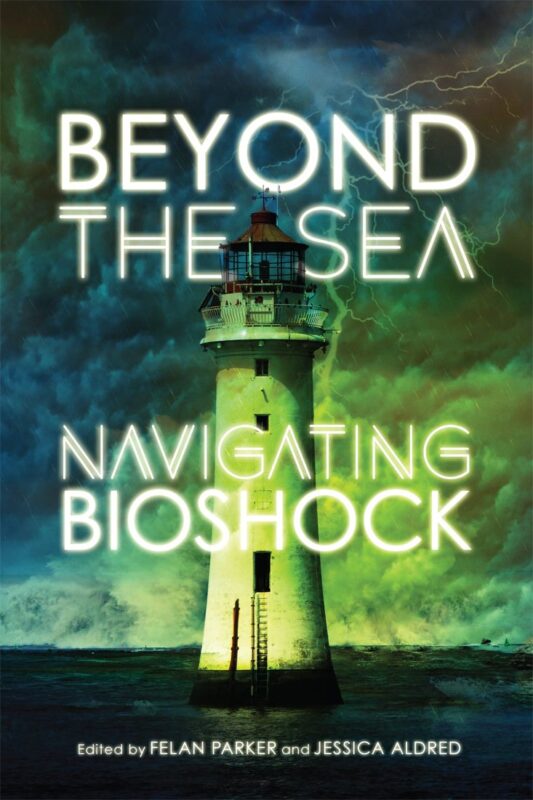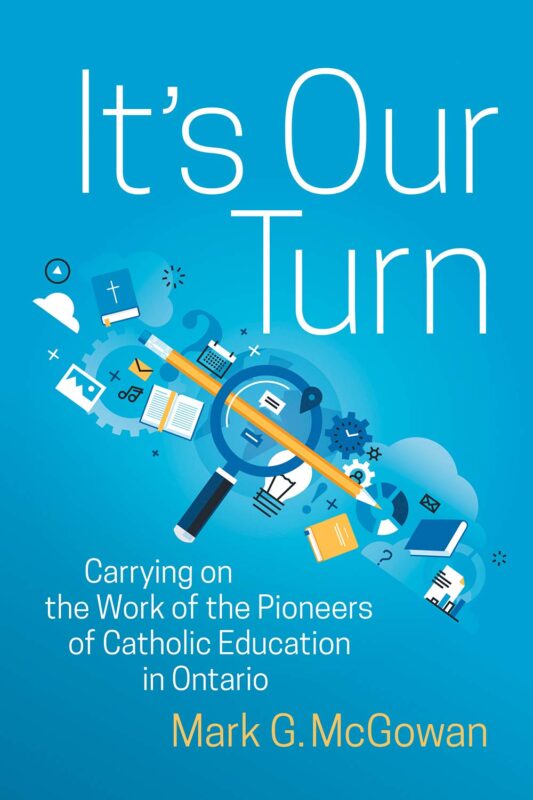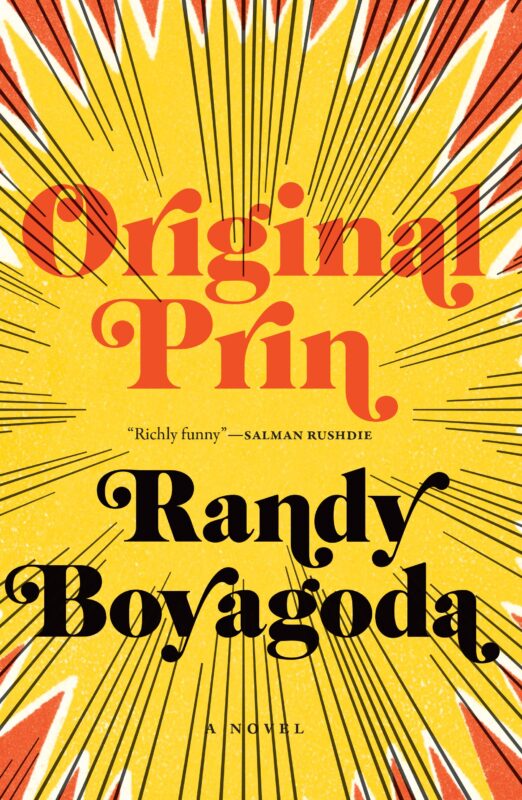Matt Doyle, Advancement Officer, Special Projects, has worked in the St. Michael’s Advancement Office for eight years, involved with a range of alumni and fundraising projects. A graduate of U of T (UC), he has studied business and project management. He lives in a place with way too many books and no television.
Living with Books
A good friend of mine once said “you live with books,” and that sentiment has resonated with me, as I’ve been working from home for nearly four months now, surrounded by my books. COVID-19 has given me more time to spend with them, gazing at their spines neatly lined up on the shelves, knowing which ones have been read and which others will be enjoyed in the future. I’ve finally found the time to alphabetize them all.
I shared that statement with someone last year and she looked at me quizzically, wondering what I meant. For the bookworm like me, it made perfect sense, with no need for an explanation. Books are different than art. Art hangs on the wall, but books are something special in your house. They’re there to be enjoyed—pulled off the shelf, returned, moved around, sorted, read, and re-read.
One author represented on my shelves is Morley Callaghan, an alumnus of St. Mike’s who graduated in 1925. Sadly overlooked today, and more remembered for knocking down Ernest Hemingway in a boxing match refereed by F. Scott Fitzgerald, at one time Callaghan was one of the most popular novelists and short story writers in Canada. His novels and stories are written in a deceptively straightforward style which belies the deeper moral concerns underpinning each one. Toronto was still very much a part of the British Empire in the 1930s, and Callaghan’s dramas focus on the Catholic minority in a city that was beginning to lose it homogeneity.
Callaghan’s career began while he was an undergrad studying at St. Mike’s, writing for the yearbook, submitting short stories to publishers, and penning articles for the Toronto Star. Besides his writing, Callaghan also organized the St. Mike’s Literary Club, where he chose the books and plays to be read by the other students, with a heavy bent to the modernist writers who were his near contemporaries. Conrad, Fitzgerald, Tarkington, Galsworthy, Shaw, and O’Neill were some of the authors Callaghan chose, all of whom were giants in the early 20th-century literary world. One wonders if the Basilian Fathers who were teaching at the school knew who Callaghan was encouraging his fellow students to read.
Debating was a popular activity on the U of T campus in the 1920s, and Callaghan was a member of the St. Michael’s team that won several debates, which would help his studies when he went to Osgoode Hall Law School after he graduated. It should also be mentioned that St. Mike’s was not only the place where Callaghan started his literary career, but he was also awarded for his boxing skills while at the college, which would come in handy when he was later challenged to that bout by Hemingway.
That’s one of the things I enjoy most about working in the Advancement Office at St. Mike’s—learning the rich traditions and stories of the College’s nearly 170-year history. The pandemic has prevented our usual in-person events from happening, including Alumni Reunion, when alumni are invited to return to campus. I miss meeting with our alumni and hearing their stories about their time at St. Mike’s. I know it’s only temporary, and our alumni will be back on campus soon. Our recent grads are our newest alumni, and who knows—maybe someday one of them will be Canada’s most popular author.
Read other InsightOut posts.
Readers looking for a new book to pass the time during social distancing will find many options for expanding their minds and imaginations in the work of authors at St. Michael’s. While the school has been a centre of excellence in teaching since its founding, USMC has also provided an institutional home to authors who have published in a wide variety of genres.
Advancing Research
Professors in St. Michael’s sponsored programs and the graduate Faculty of Theology publish scholarly monographs and edit collections of academic essays to advance research in their fields.
Alison More, holder of the inaugural Comper Professorship in Medieval Studies, explores the story of pious medieval laywomen in Fictive Orders and Feminine Religious Identities, 1200-1600 (Oxford University Press, 2018). Her book continues a long tradition of excellence in medieval scholarship and publication at St. Michael’s, which also includes the regular publication of books under the publications programme of the Pontifical Institute of Medieval Studies (PIMS).
Book and Media Studies is a natural fit for students interested in studying book history, but what about books themselves? St. Michael’s Assistant Professor Felan Parker made use of his cutting-edge work in game studies while co-editing Beyond the Sea: Navigating Bioshock (McGill-Queen’s University Press, 2018), a collection of critical essays on the beloved video game franchise. In the same department, professor Paolo Granata has written numerous books in Italian on media and media ecology, including the first guide to art resources on the web ever published in Italy.
Parker and Granata‘s BMS colleague Iris J. Gildea’s book Toward a Poetics of Freedom: An interpretive analysis of Ricoeur and Dante (Lambert Publishing: 2014) argues the thought of philosopher Paul Ricoeur changed after an encounter with the poetry of Dante Alighieri—and the great Italian poet is himself the focus of a special collection of rare books and illustrations housed in the Kelly Library.
Religion adds a special dimension to the scholarship of several St. Michael’s authors. Christianity and Culture professor Michael O’Connor’s Cajetan’s Biblical Commentaries: Motive and Method (Brill, 2017) has been described as “a very welcome addition to our knowledge of religious scholarship in the Renaissance.” Fellow Christianity and Culture prof Reid Locklin is the co-editor of Teaching Civic Engagement (Oxford University Press, 2016) a book that explores the role of religious education in fostering a vibrant democratic order.
On the civic theme, Canadian historian and St. Michael’s professor Mark McGowan is the author of historical studies such as The Imperial Irish: Canada’s Irish Catholics Fight the Great War (McGill-Queen’s University Press, 2017), which brings together Canadian religious and military history. His book It’s Our Turn: Carrying on the Work of Pioneers of Catholic Education in Ontario (Novalis, 2017) tells the story of Catholic education in Ontario, and casts a vision for its future.
Professors in the St. Michael’s Faculty of Theology advance scholarly conversations in fields ranging from Historical Theology to Interfaith Studies. Professor John McLaughlin, an Old Testament scholar recently appointed Interim Dean of the Faculty of Theology, has written numerous books including An Introduction to Israel’s Wisdom Traditions (Eerdmans, 2018), currently available in an e-book format for under $3. Professor Callie Callon’s Reading Bodies: Physiognomy as a Strategy of Persuasion in Early Christian Discourse (T&T Clark, 2019) explores the use of physiognomy in the rhetoric of early Christian theologians and writers.
Enriching Culture
Authors at St. Michael’s have also written for audiences outside the confines of academic disciplines. Principal and Vice-President Randy Boyagoda has published several critically acclaimed literary novels and a widely-reviewed biography of an important American Catholic public intellectual. He is currently at work on a Dantean trilogy of novels. The first, Original Prin (Biblioasis, 2018), is an academic satire set on the downtown campus of a Catholic university.
Celtic Studies Assistant Professor Máirtín Coilféir’s poem Cumhdach (Kelly Library Print Studio, 2019) was custom printed and bound at St. Michael’s. He is currently working on a translation of The Adventures of Huckleberry Finn into Irish.
Professors Boyagoda and Coilféir belong to a long lineage of creative writers at St. Michael’s. In the first half of the 20th century, Canadian novelist Morley Callaghan called St. Mike’s home. After graduating, he would help build the Canadian literary tradition with numerous novels, and short fiction for outlets like the New Yorker. Midcentury novelist Hugh Hood called St. Michael’s home as well, as have more recent creative writers such as poet Anne Carson, novelist Anthony De Sa, and Unbuilt Toronto author Mark Osbaldeston.
The literary legacy of St. Michael’s continues, with dozens of faculty and staff publications made available for borrowing from the Kelly Library in a special section near the entrance. The building is closed for now, but the list—including many more books that could not be mentioned here—is available online, with some books available for electronic borrowing.

